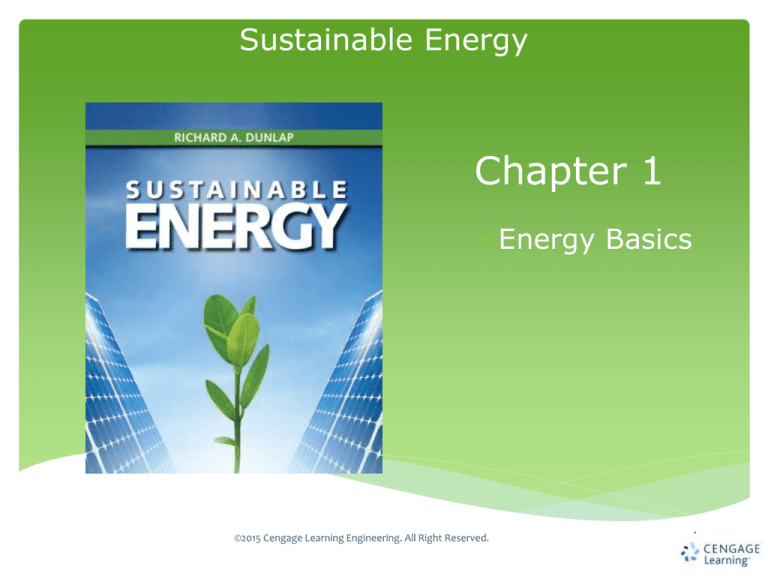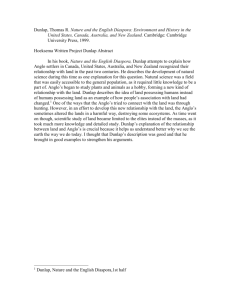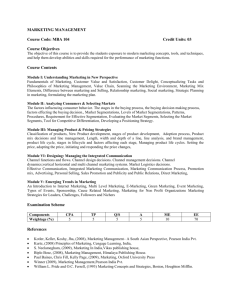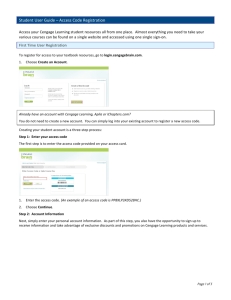
Sustainable Energy
Chapter 1
Energy Basics
©2015 Cengage Learning Engineering. All Right Reserved.
1
Sustainable Energy
Dunlap
Learning Objectives
●
●
●
●
●
●
The relationship between energy and power.
The forms of energy.
The laws of thermodynamics.
Heat engines and their Carnot efficiency.
Heat pumps and their coefficient of
performance.
How electricity is generated and distributed.
©2015 Cengage Learning Engineering. All Right Reserved.
2
Sustainable Energy
Dunlap
Work and Energy
Energy is defined as the ability to do work.
Work is the product of a force and the distance over which
it acts
Force is given by Newton's law as
Work done against a gravitational field to lift an object to
a height h is
and this is equal to the potential energy associated with
the object.
©2015 Cengage Learning Engineering. All Right Reserved.
3
Sustainable Energy
Dunlap
Power
Power is the rate at which work is done or
energy is the product of power times the time
over which it is utilized
©2015 Cengage Learning Engineering. All Right Reserved.
4
Sustainable Energy
Forms of Energy
Dunlap
Energy can take on many forms:
• Kinetic energy (e.g., of a moving automobile)
• Gravitational potential energy (e.g., of water in a
reservoir)
• Thermal energy (e.g., in a pot of boiling water)
• Chemical energy (e.g., stored in a liter of gasoline)
• Nuclear energy (e.g., stored in a gram of uranium)
• Electrical energy (e.g., used by a light bulb)
• Electromagnetic energy (e.g., that associated with a
beam of sunlight)
©2015 Cengage Learning Engineering. All Right Reserved.
5
Sustainable Energy
Kinetic energy
Dunlap
Kinetic energy is associated with the movement of
an object.
This may be translational motion with kinetic
energy
or rotational motion with kinetic energy
©2015 Cengage Learning Engineering. All Right Reserved.
6
Sustainable Energy
Dunlap
Potential energy
Potential energy is most commonly associated with
the energy of an object in a gravitational field
given by
This may be converted into kinetic energy as an
object falls through a distance h
©2015 Cengage Learning Engineering. All Right Reserved.
7
Sustainable Energy
Dunlap
Thermal energy
Thermal energy is the kinetic energy associated
with the microscopic movement of molecules
For a gas this is related to temperature by
where n is the number of moles of gas
©2015 Cengage Learning Engineering. All Right Reserved.
8
Sustainable Energy
Dunlap
Thermal energy of liquids and solids
A quantity of energy Q supplied to a material of
mass m and specific heat C will increase the
temperature by ΔT
©2015 Cengage Learning Engineering. All Right Reserved.
9
Sustainable Energy
Dunlap
Chemical energy
Chemical energy is the energy associated with
chemical bonds.
Chemical energy can be released in exothermic
reactions and absorbed in endothermic
reactions.
Energy released in combustion reactions
(burning) is the heat of combustion.
©2015 Cengage Learning Engineering. All Right Reserved.
10
Sustainable Energy
Dunlap
Important oxidation reactions and
heats of combustion
Burning of pure carbon (an approximation of coal)
Burning of methane (major component of natural gas)
Burning of ethanol (a common biofuel)
Burning of octane (an important component of gasoline)
©2015 Cengage Learning Engineering. All Right Reserved.
11
Sustainable Energy
Dunlap
Nuclear energy
Energy associated with the bonds between neutrons and
protons in the nucleus
Much greater than chemical energy and may be released
during nuclear reactions
Energy release during an exothermic nuclear reaction is
related to changes in the total mass of the system by
Einstein's relation
©2015 Cengage Learning Engineering. All Right Reserved.
12
Sustainable Energy
Dunlap
Electrical energy
Energy associated with flow of electrons in a conductor
A current I flowing through a conductor with a resistance R
will experience a voltage drop V given by Ohm's law
Power dissipated through the resistance is
or
©2015 Cengage Learning Engineering. All Right Reserved.
13
Sustainable Energy
Dunlap
Electromagnetic energy
Energy of the electric and magnetic fields associated with
electromagnetic waves (such as light)
Waves have a wavelength λ related to the frequency f and
the velocity (speed of light)
©2015 Cengage Learning Engineering. All Right Reserved.
14
Sustainable Energy
Dunlap
Electromagnetic spectrum
Electromagnetic radiation includes a wide range of
wavelengths, including visible light
©2015 Cengage Learning Engineering. All Right Reserved.
15
Sustainable Energy
Dunlap
Photons
Quantum mechanically electromagnetic radiation can be
thought of as quanta of energy called photons
The energy associated with a photon is related to its
frequency by Planck's constant
©2015 Cengage Learning Engineering. All Right Reserved.
16
Sustainable Energy
Dunlap
The laws of thermodynamics
0. Two systems that are both in thermodynamic
equilibrium with a third system are in equilibrium
with each other.
1. Energy is conserved.
2. A closed system will move toward equilibrium.
3. It is impossible to attain absolute zero temperature.
©2015 Cengage Learning Engineering. All Right Reserved.
17
Sustainable Energy
Dunlap
Zeroth law of thermodynamics
This law implies that the thermodynamic state of
system can be defined by a single parameter, the
temperature
For a gas the temperature is defined in terms of
the ideal gas law
©2015 Cengage Learning Engineering. All Right Reserved.
18
Sustainable Energy
Dunlap
Absolute zero
For any temperature scale, the ideal gas law indicates a linear
relationship between temperature and pressure where the
intercept on the temperature axis give the value of absolute
zero.
©2015 Cengage Learning Engineering. All Right Reserved.
19
Sustainable Energy
Dunlap
First law of thermodynamics
Consider an experiment where heat is applied to a cylinder
containing gas that is sealed with moveable piston
©2015 Cengage Learning Engineering. All Right Reserved.
20
Sustainable Energy
Dunlap
Conservation of energy
If the piston is allowed to move as the gas is heated then
the conservation of energy implies that the heat added to
the system is given by the sum of the work done on the
piston and the change in the internal energy of the gas
©2015 Cengage Learning Engineering. All Right Reserved.
21
Sustainable Energy
Dunlap
Second law of thermodynamics
The implications of the second law are that heat will
naturally flow from a hot place to a cold place.
It is the transfer of heat from hot to cold that allows
thermal energy to do useful work.
This is analogous to gravitational potential energy - an
object in a gravitational field can only do work if it moves
from a point of higher gravitational potential to a point of
lower gravitational potential.
©2015 Cengage Learning Engineering. All Right Reserved.
22
Sustainable Energy
Dunlap
Heat engines
If heat Qh is removed from a hot reservoir and a portion
of this heat Qc is added to a cold reservoir then the
difference can be used to do work W.
Conservation of energy requires that
©2015 Cengage Learning Engineering. All Right Reserved.
23
Sustainable Energy
Dunlap
Schematic diagram of a heat engine
©2015 Cengage Learning Engineering. All Right Reserved.
24
Sustainable Energy
Dunlap
Carnot efficiency
The efficiency of a heat engine (in %) is
Carnot showed that
where temperatures are measured on an absolute
temperature scale.
The ideal Carnot efficiency can be expressed in terms of
the reservoir temperatures as
©2015 Cengage Learning Engineering. All Right Reserved.
25
Sustainable Energy
Dunlap
Heat pump
A heat pump uses mechanical energy (work) to transport
heat from a cold reservoir to a hot reservoir
Conservation of energy requires
and the coefficient of performance gives the ratio of heat
transported to work input
or
©2015 Cengage Learning Engineering. All Right Reserved.
26
Sustainable Energy
Dunlap
Schematic diagram of a heat pump
©2015 Cengage Learning Engineering. All Right Reserved.
27
Sustainable Energy
Dunlap
Applications of heat engines and heat pumps
The concept of a heat engine describes the basic principles
of steam turbines or internal combustion engines which
convert thermal energy into mechanical energy.
The concept of a heat pump describes the operation of a
refrigerator which transports heat from a place we want to
keep cold to a warm reservoir (room temperature)
or
A heat pump can be used for heating purposes by
transporting heat from the cold outside to the inside of a
building.
©2015 Cengage Learning Engineering. All Right Reserved.
28
Sustainable Energy
Dunlap
Electricity generation
Breakdown of world electricity production
©2015 Cengage Learning Engineering. All Right Reserved.
29
Sustainable Energy
Dunlap
Fossil fuel generating plants
Fossil fuels may be used in
• thermal generating stations
• combustion turbines
©2015 Cengage Learning Engineering. All Right Reserved.
30
Sustainable Energy
Dunlap
Thermal generating stations
Thermal generating stations use the combustion
of fossil fuels (commonly coal, but also oil or
natural gas) to boil water to make steam which
then runs a turbine to turn a generator to produce
electricity.
©2015 Cengage Learning Engineering. All Right Reserved.
31
Sustainable Energy
Dunlap
Schematic of a thermal generating station
©2015 Cengage Learning Engineering. All Right Reserved.
32
Sustainable Energy
Dunlap
Rotor assembly of a steam turbine
©2015 Cengage Learning Engineering. All Right Reserved.
33
Sustainable Energy
Dunlap
Heat transfer to the environment
We need to remove heat from the cold reservoir in order to
improve the Carnot efficiency
Two common ways of doing this are
• Once through water cooling using the ocean, river, lake,
etc.
• Atmospheric cooling towers
©2015 Cengage Learning Engineering. All Right Reserved.
34
Sustainable Energy
Dunlap
Cooling towers to transfer heat to
the atmosphere
©2015 Cengage Learning Engineering. All Right Reserved.
35
Sustainable Energy
Dunlap
Combustion turbine
Similar to a jet engine
Uses liquid or gaseous fuels (e.g. gasoline or natural
gas)
More expensive to operate than a coal fired thermal
station but can be brought on-line quickly during times
of high demand
©2015 Cengage Learning Engineering. All Right Reserved.
36
Sustainable Energy
Dunlap
Combustion turbines
©2015 Cengage Learning Engineering. All Right Reserved.
37
Sustainable Energy
Dunlap
Distribution of electricity
Power loss due to resistance in transmission
cables is minimized by using high voltage.
Losses are inversely proportional to the voltage
squared
©2015 Cengage Learning Engineering. All Right Reserved.
38
Sustainable Energy
Dunlap
Power distribution transformers
Transformers are used
to step up voltage for
distribution and to step
down voltage for end
users.
©2015 Cengage Learning Engineering. All Right Reserved.
39
Sustainable Energy
Dunlap
Summary
• Energy is the ability to do work.
• Power is energy produced or expended per unit time.
• Energy can be categorized as: kinetic, potential, thermal,
chemical, nuclear, electrical or electromagnetic energy.
• The zeroth law of thermodynamics allows for the definition of a
temperature scale
• The first law of thermodynamics describes the conservation of
energy.
• The second law of thermodynamics describes the operation of
heat engines and heat pumps.
• Heat engines use the flow of heat to produce mechanical energy
• Heat pumps use mechanical energy to transport heat from a
cold place to a hot place.
• Fossil fuels can be used to generate electricity in thermal
generating stations or in combustion turbines.
• Electricity is most efficiently distributed using high voltages.
©2015 Cengage Learning Engineering. All Right Reserved.
40



